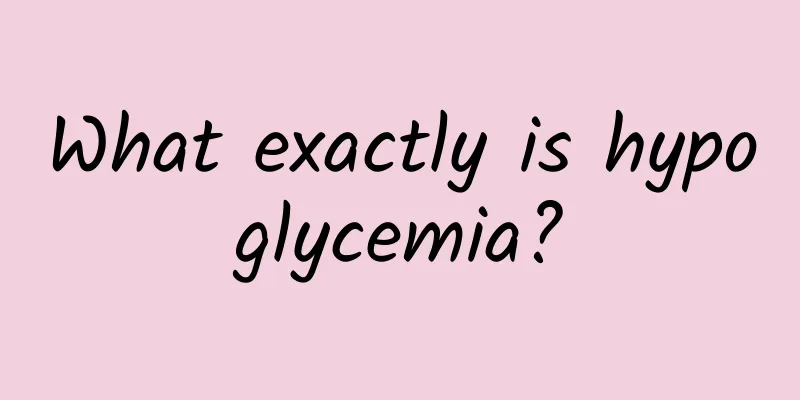What exactly is hypoglycemia?

|
There was a news report that a woman fainted due to low blood sugar, which caused a stampede in the Shenzhen subway, injuring 12 people. Such news reports of people fainting in public due to "low blood sugar" are often seen. We should be alert to the occurrence of low blood sugar in our daily lives. Low blood sugar not only causes dizziness and fainting, but its harm should not be underestimated. What is hypoglycemia? All cells in our body need energy to function, and glucose provides energy to the body. When there is not enough glucose, or sugar, in the blood, hypoglycemia occurs. Hypoglycemia is diagnosed when a fasting blood sugar concentration is less than 2.8 mmol/L for adults and ≤3.9 mmol/L for people with diabetes [1]. What are the symptoms of hypoglycemia? Patients with mild hypoglycemia may experience hunger, tremors, cold sweats, pale complexion, palpitations, rapid heartbeat, dizziness and weakness, abnormal skin sensation, and blurred vision. Patients with moderate hypoglycemia may experience cognitive impairment, slurred speech, and shortness of breath. Patients with severe hypoglycemia may experience coma, hypoglycemic shock, or even death [1, 2]. What causes hypoglycemia? First of all, we need to distinguish hypoglycemia in patients with related diseases from hypoglycemia in normal people. For example, hypoglycemia in diabetic patients is mainly due to the use of drugs that lead to poor pancreatic function, failure to eat on time or eating too little after taking the drugs, increased exercise, drinking on an empty stomach, and alcoholism. If there are no related diseases or medications, the cause of hypoglycemia may be hunger, exercise, drinking, etc. After getting up in the morning, the blood sugar level in the body is low. The activities of the brain and various organs of the human body depend on the supply of glucose. If you often skip breakfast or are hungry for a long time, the source of blood sugar will be blocked, which will directly affect the normal activities of the brain and various organs, and symptoms such as inattention, dizziness, palpitations, and tremors will appear. It is worth noting that if you eat a large amount of high-sugar fruits such as lychees on an empty stomach, it will cause a large amount of insulin secretion, leading to hypoglycemia. Long-term high-intensity exercise may also lead to hypoglycemia. Intense exercise consumes a lot of energy and if it is not replenished in time, symptoms of hypoglycemia such as fatigue, muscle aches, dizziness, and palpitations may occur [3]. In addition to hunger and exercise, alcohol has also been shown to induce fasting hypoglycemia. Excessive drinking can increase glucose-stimulated insulin secretion, and the mixture of alcohol and sucrose can lead to excessive insulin secretion and thus induce hypoglycemia [4]. In addition, emotional excitement may also lead to hypoglycemia. The central nervous system also has the function of regulating blood sugar metabolism. Once in a state of emotional tension and excitement, the central nervous system will stimulate the secretion of insulin, thereby causing hypoglycemia. How can we prevent hypoglycemia? The first thing is to have a regular diet and develop the habit of eating at regular times and in regular amounts. Eat a full breakfast, drink little or no alcohol, do not be hungry for a long time or drink on an empty stomach, and be careful not to consume large amounts of high-sugar foods on an empty stomach. Usually, you should avoid long-term strenuous exercise, and do not exercise on an empty stomach in the morning. You should also pay attention to regulating your mood and avoid emotional fluctuations. If symptoms of hypoglycemia occur, do not panic. For mild hypoglycemia, you can replenish some food in time, pay attention to rest, and avoid fatigue. You can also take oral glucose solution or intravenous infusion of glucose to relieve symptoms. If necessary, seek medical attention immediately and get regular diagnosis and treatment in time. References: 1. Ge Junbo, Xu Yongjian: Internal Medicine. 8th Edition: Internal Medicine. 8th Edition; 2013. 2. Amiel SA, Aschner P, Childs B, Cryer PE, Galan BD, Frier BM, Gonder-Frederick L, Heller SR, Jones T, Khunti K: Hypoglycaemia, cardiovascular disease, and mortality in diabetes: epidemiology, pathogenesis, and management. Lancet Diabetes & Endocrinology 2019. 3. Zhang Junbao: A brief discussion on exercise-induced hypoglycemia. New Curriculum (Part 1) 2010(10):63-63. 4. Liu Yanmei, Yu Jiancheng, Wang Ke: Clinical analysis of 15 cases of hypoglycemia induced by alcohol consumption. Chinese Journal of Medicine, 2011, 13(2):200-201. |
<<: What does raw oysters taste like (the meat is soft, elastic and has a strong umami taste)
>>: Why is Tempura called Tempura? What are the main ingredients of Tempura?
Recommend
Can I drink tea while taking donkey-hide gelatin?
Donkey-hide gelatin is a very common health produ...
At what age do girls start to change their voice?
When women enter puberty, they are already 12-14 ...
Don't be afraid of epilepsy, talk about the treatment of epilepsy
Epilepsy, commonly known as "epilepsy",...
How to tell a woman's health from her belly button
The abdomen is one of the most sexy parts of a wo...
Three important things to note after liposuction surgery
The waist and abdomen are the parts of the human ...
What should pregnant women drink?
The diet of pregnant women during pregnancy is ve...
[Medical Q&A] Are all people with autism "idiot geniuses"?
Planner: Chinese Medical Association Reviewer: Wa...
How to make pork kidneys delicious (Lu cuisine style home cooking is the best fried pork kidneys)
...
What are the dangers of eating spicy food during breastfeeding?
It is very important for breastfeeding women to s...
3 benefits of hot springs for women
In recent years, health and wellness has become o...
The 7 Best Natural Moisturizers
1. Smooth wax We used to think that heat was only...
Why do my hands hurt and I can’t hold them during late pregnancy?
Pregnant women will show different reactions in m...
My nipples are hard and painful
Many people find that their nipples are hard and ...
Cesarean section maternity diet
Giving birth is a big project. There are no major...
Will eating donkey-hide gelatin cakes in summer cause internal heat?
Will eating donkey-hide gelatin cause internal he...









